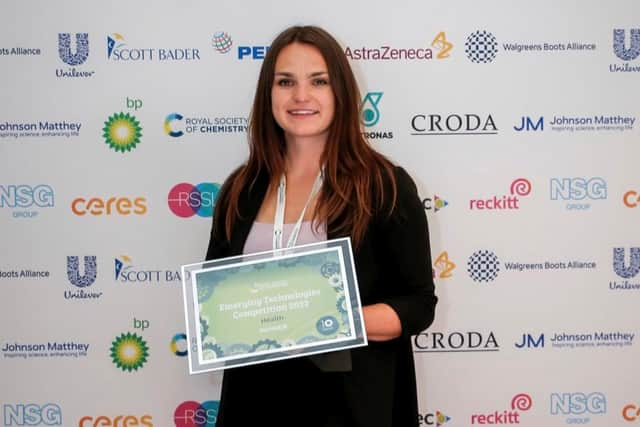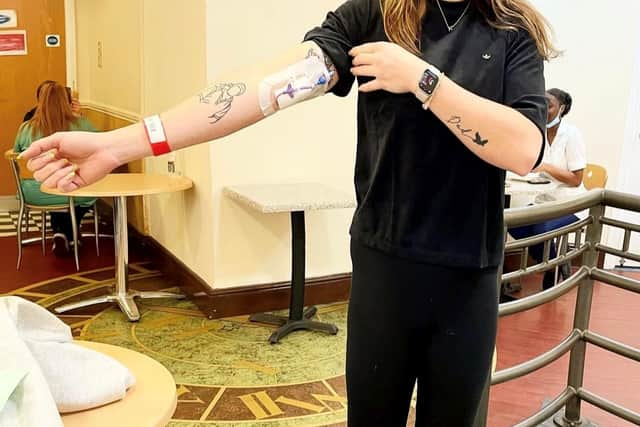World leading scientist Kirsty Smitten from Solihull dies of heart cancer after developing new antibiotics
and live on Freeview channel 276
One of Britain’s top young scientists has died aged just 29 from a rare form of heart cancer.
Kirsty Smitten, from Solihull, was a “world leading” scientist set to potentially save tens of millions of lives with her new antibiotic medicine. She passed away in hospital with her family beside her last Wednesday (October 4), having spent the past seven weeks in Birmingham’s Queen Elizabeth Hospital.
Advertisement
Hide AdAdvertisement
Hide AdWhen she first attended hospital last November doctors thought she’d just pulled a muscle. But she later received a terminal diagnosis and was given just months to live.
Kirsty was named a Forbes under 30 scientist and in February this year was crowned FSB’s Young Entrepreneur of the Year. Her cancer, cardiac angiosarcoma, was so rare her surgeon had never seen it before. Only two people are diagnosed with it a year in the UK.
Speaking in March this year, she said when she first arrived at A&E with severe heart pain she was sent away by the GP and told to take codeine for a pulled muscle. But she insisted something was wrong so waited for 11 hours before a CT scan revealed a cancerous tumour in her right atrium.
Kirsty said: "Other than the fact I was in agony all my health was absolutely fine, I didn’t have any problems with heart rate or anything. But then they did a CT scan for my blood clot and found a 6cm tumour in my heart, which, obviously, was a bit of a shock, because I had no other symptoms prior to that.
Advertisement
Hide AdAdvertisement
Hide Ad“It’s been a bit hectic since then. They found the tumour but initially they didn’t think it would be cancerous because it’s really, really rare."


It’s scarcity meant it took three months to diagnose Kirsty and she’s been told here is currently a 68 per cent chance she will die in the next 12 months. Despite constant pain and weekly chemotherapy, she continued her vital work.
While doing her microbiology PhD at University of Sheffield, the science star developed a new class of antibiotics treating multi-drug resistant bacteria. Big pharma’s interest was piqued, and through funding Kirsty set up MetalloBio in March 2021 - tackling the challenge of becoming a CEO while finishing her PhD.
Months later she was ranked on Forbes 30 Under 30 and the company received an award from the Royal Society of Chemistry’s emerging technologies competition. She said: “If we get the new drugs on the market it will potentially save tens of millions of lives.
Advertisement
Hide AdAdvertisement
Hide Ad“A new class of antibiotics hasn’t reached clinics in over 30 years, and by 2050 antibiotic microbial resistance is expected to kill 10 million people, which is a death every three seconds per year. We would be able to prevent that.
“I now see how important my work is, because if I get an infection I have about an hour to get IV antibiotics before it becomes fatal because with chemo I don’t have an immune system at the moment. I still work, I just can’t work the same as I used to and i can’t go to to as many in person things.
“I think it’s hit a lot of our investments. A lot of the investors we have are very committed to me, and how I built the company and the passion I have for what we’re doing and my drive to take it forward. As bad as it is, me being ill hampers that. If you take away that drive, is the company still going to succeed?”


Just over a year after setting up MetalloBio, she said she was at the peak of her well-being, playing hockey and football once or twice a day, no ill-health, no fatigue, and travelling across the globe to speak at science conferences.
Advertisement
Hide AdAdvertisement
Hide AdBut in November last year she was woken up the night with severe chest pain. Due to Kirsty’s frequent flights to America her mum suspected it was a blood clot, and they headed to A&E for tests. Given her age and her health the doctor concluded that she pulled a muscle in the gym or playing football.
She added: “To get any kind of growth in your heart is very rare because your heart cells don’t replicate after a certain age. I work in med-tech, and no one wants to fund something that only one person in 36 million is going to use, so there’s no new developments.
Research into cardiac angiosarcoma is lacking because it affects so few people. Doctors said her tumour was inoperable, but as a scientist she delved into the research and learned of people with more severe cases having the “pretty much their whole hearts” removed and rebuilt.
The Royal Marsden, a world-leading cancer care charity in London, gave her a second opinion and said they would perform surgery. That gives Kirsty a 10 percent chance of surviving for five years.
Advertisement
Hide AdAdvertisement
Hide AdShe added: “I thought I was going to have kids and a family and I’ve told I’ve got seven months to live. I had to have emergency chemotherapy and I didn’t have a chance to freeze my eggs. So it’s been a bit of a tough couple of months."
Comment Guidelines
National World encourages reader discussion on our stories. User feedback, insights and back-and-forth exchanges add a rich layer of context to reporting. Please review our Community Guidelines before commenting.